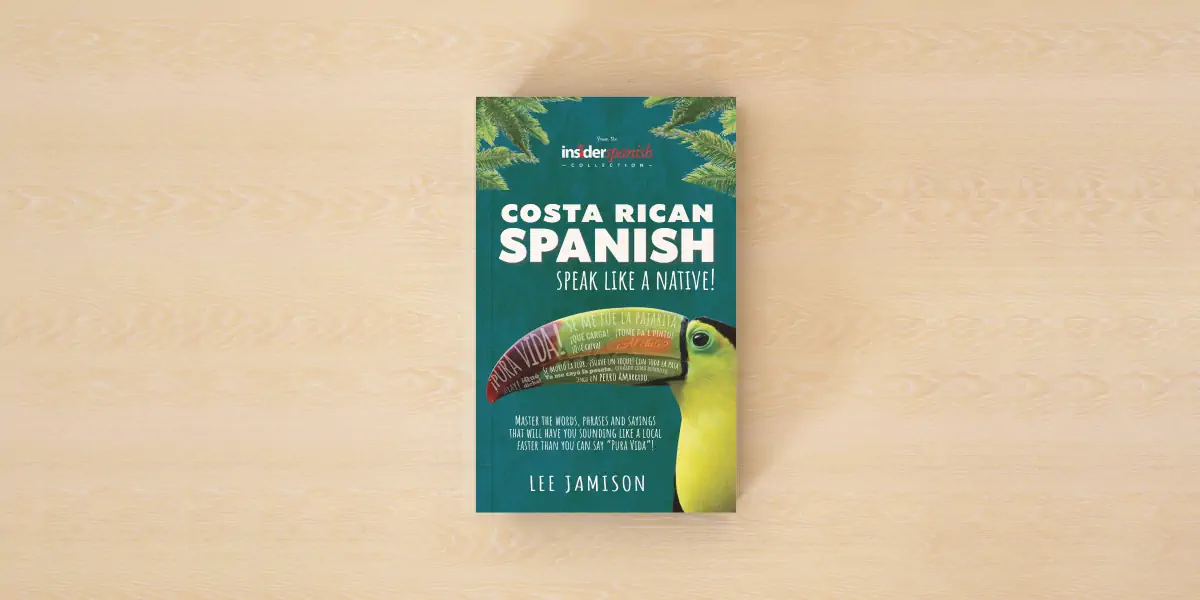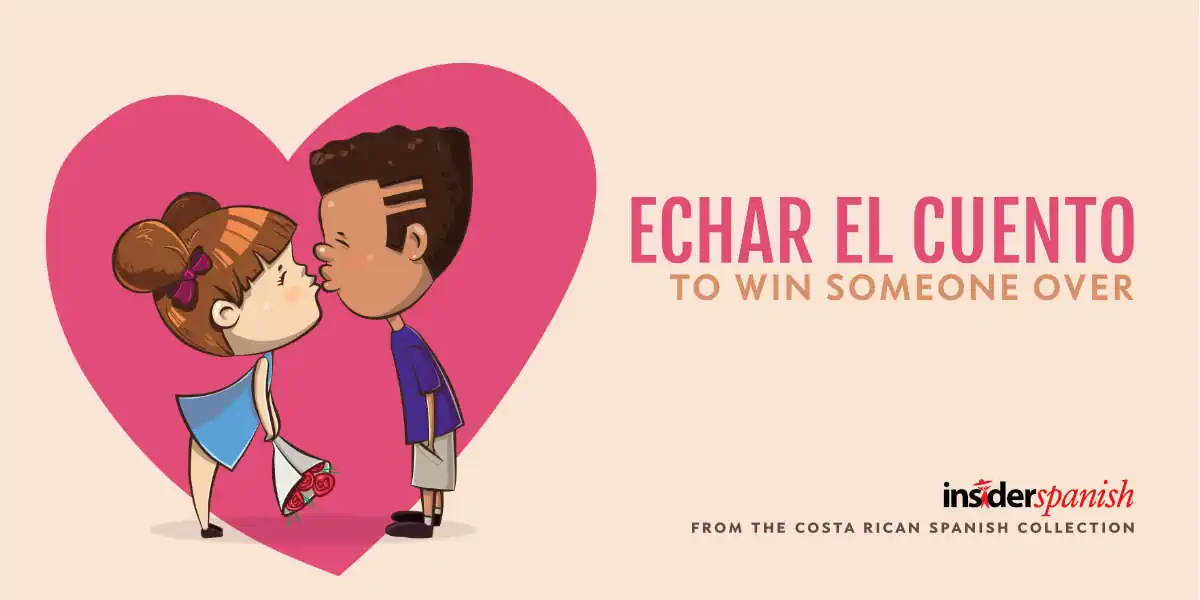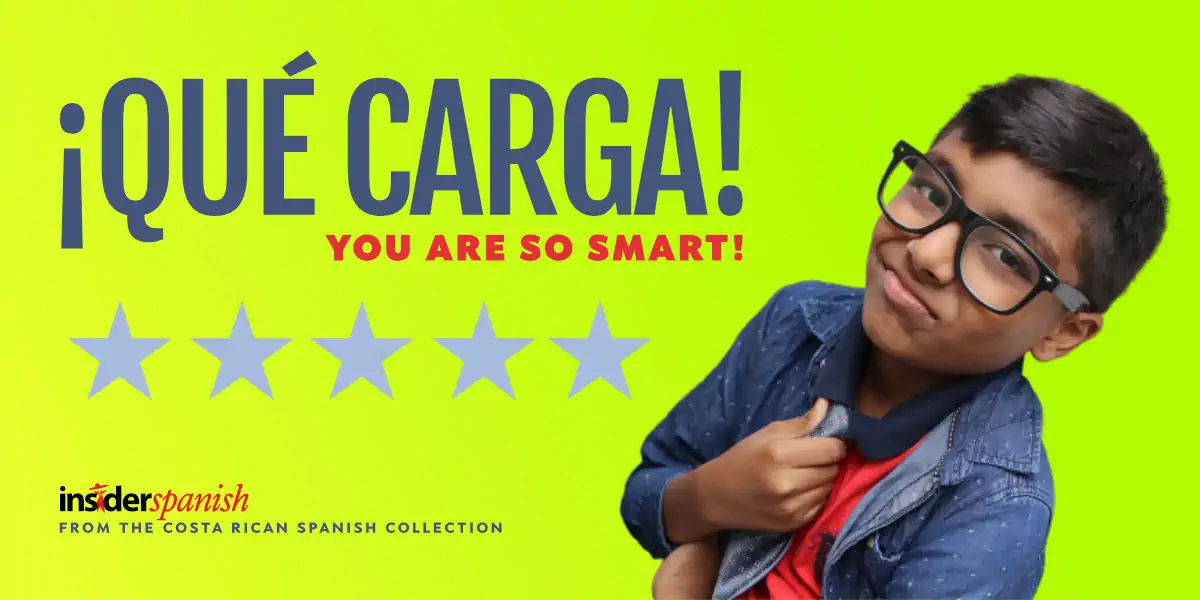20 Ways to Speak Costa Rican Spanish
What makes Costa Rican Spanish, well, Costa Rican? Come along as we explore 20 examples of local words, idioms, and sayings.
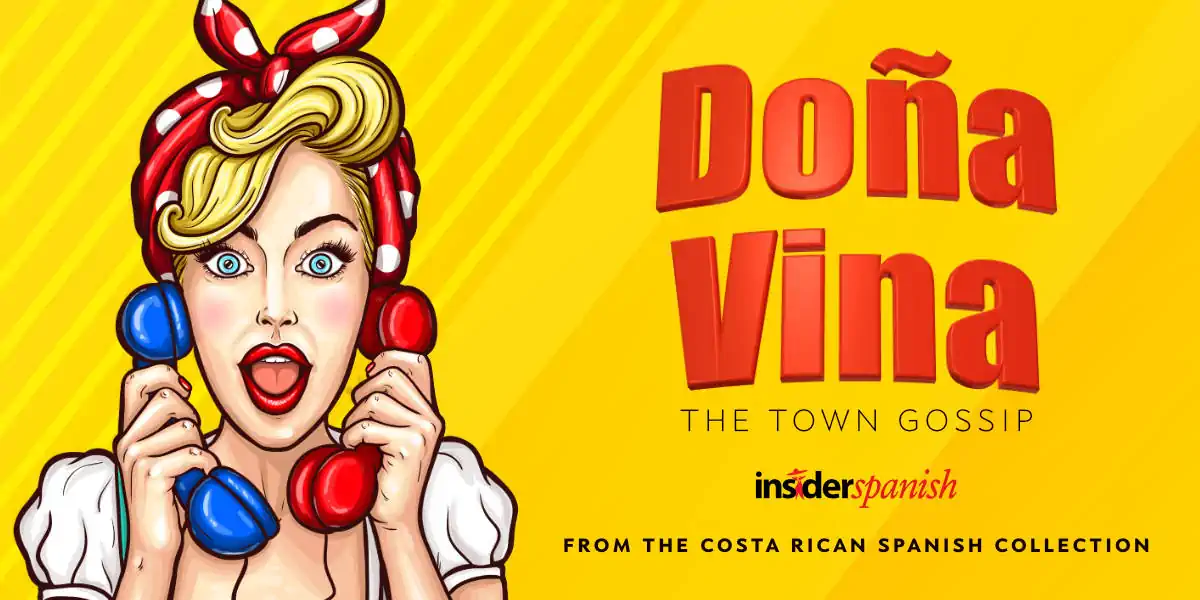
Image by vectorpocket on Freepik
⛱ COSTA RICA is one of the hottest tourist destinations in the world. But to get the most out of your time there, you need more than generic Spanish. Learn these 20 Costa Rican Spanish words and phrases, and you will fit right in!
1. andar a trole
Locals in jest call their foot a trole. For that reason, andar a trole means to walk.
⚽ Voy a trole.
🏈 I am walking.
You could also say: “Voy troleando.” It means the same. Another option is to say: Ando a pata. This literally means: I am walking on all fours. I’m not sure I could bear to say it.
2. bombeta
In Costa Rica there is a kind of bomb that doesn’t explode, because a bomba is a rhyming folkloric jingle, often humorous and many times created on the spur of the moment. And the artist making it up is called a bombeta. Today the term refers to the person who wants to be the center of attention, the class clown, the ham of the party.
⚽ Como soy tan bombeta, me atreví a hablar con el presidente.
🏈 Since I am so outgoing, I took the liberty of speaking to the president.
3. estar de Bagaces a Liberia
The cities of Bagaces and Liberia are in the northern part of the country. But the important thing to know is that Bagaces sounds like vago, which means a bum. If someone is de Bagaces a Liberia, it means he is bumming around. A local writer penned:
⚽ En estas vacaciones de Semana Santa estaremos de Bagaces a Liberia.
🏈 During the Holy Week vacation we will be bumming around.
4. cerrado como bombillo
This phrase literally means to be closed like a light bulb. Imagine: Your light bulb has burned out. Would you attempt to open it and change the filament? Impossible! It is completely sealed and can’t be fixed. And so are the close-minded.
⚽ Rodolfo nunca quiere probar cosas nuevas. Es cerrado como bombillo.
🏈 Rodolfo never wants to try new things. He is close-minded.
5. brete
Francisco Malespín was a Salvadorean military officer and politician who lived during the first half of the 19th century. Perhaps his greatest claim to fame was the invention of a secret code that was used to communicate with his men. In the code, certain key letters were changed: A for E, I with O, M with P, F with G, C with S, and T with B. In this code, trabajo, or work, would become breteji, or brete for short. So, ¡vamos al brete! Let’s go to work! Actually, if you are on vacation, that’s the last thing you want to do!
⚽ A: ¿Qué hace usted ahora?
⚽ B: Acá en el brete.
🏈 A: What are you doing right now?
🏈 B: Just here working.
6. buena nota
Nothing make parents happier than when their children get good grades. This phrase literally means good grade.
⚽ Vieras que Jaime es buena nota.
🏈 That Jaime is a really nice guy.
7. bostezo
This literally means a yawn. It’s the local term for a boring person.
⚽ No quiero salir con él, es un bostezo.
🏈 I don’t want to go out with him. He’s such a bore.
When referring to such a stick in the mud, you just exclaim:
⚽ ¡Qué bostezo!.
🏈 What a bore!
8. Está cayendo pelo de gato.
When torrential rains come, in English we say that it is raining cats and dogs. But in this part of the world, cat hair falls. This weather metaphor means: It’s drizzling.
⚽ Estaba cayendo pelo de gato y no quiero resfriarme.
🏈 It’s drizzling and I don’t want to catch a cold.
9. choricear
This literally means to make sausage. Imagine the scene: The sausage maker grinds up pork and stuffs it into the sausage casing of his choice. But what if he gets a little greedy? Could he introduce a bit of ground meat of inferior quality? The temptation is always there. That’s why choricear in Costa Rica means to sell pirated goods. And the one carrying out the dirty deed is called a choricero. A headline in the daily La Teja announced:
⚽ De tal palo, tal astilla: heredero de Samsung a la cárcel por choricero.
🏈 Like father, like son: Samsung heir sent to jail for selling pirated goods.
10. echar el cuento
How do you convince a girl that you love her? That has been the subject of songs and movies the world over. Locally, you achieve this goal by telling a good story, or cuento.
⚽ Pedro fue a echar el cuento a María.
🏈 Pedro went to try to woo over María.
11. como un ajito
This literally means like a garlic clove. Try this: Peel a clove of garlic. Notice how shiny the surface is? This detail was not lost on the locals, who use garlic as a metaphor for extreme cleanliness. After giving your dog a bath, you might say: Lo dejaron como un ajito. In other words, he’s squeaky clean. A man posted this classified:
⚽ Nissan 1200: ¡Hecho Un Ajito!.
🏈 Nissan 1200: Super clean!
That just leaves us with one doubt: If you were to buy a car with that description, would it need an air freshener?
12. falta de cancha
This literally means: lack of field. Consider this: Soccer is king in Costa Rica. And the more time you are on the field, or cancha, the more experience you acquire.
⚽ ¡Uy, me faltó cancha! No compré los boletos a tiempo.
🏈 Dang, I messed up. I didn’t buy the tickets in time.
13. Está de chicha.
Chicha is a fermented corn drink. If you put it in a bottle and cork it, watch out! The fermentation process will continue and the cork may pop. That’s why estar de chicha means to get very angry.
⚽ A veces mi hijo está de chicha cuando se pelea con la novia.
🏈 Sometimes my son is ticked off when he fights with his girlfriend.
14. doña Vina
In San José’s Barrio México there once lived a certain Etelvina de Avendaño, who became a notorious gossip. Based on her experience, a popular comedic radio program was created titled Viniando con doña Vina, which roughly translates to Butting in with Ms. Busybody. To this day a vina (pronounced BEAN-uh) is a busybody or buttinsky.
⚽ Cuidado con esa doña Vina. Se mete en todo.
🏈 Watch out for that busybody. She sticks her nose in everything.
Yikes!
15. dolor de jupa
If you are feeling a little depressed and lazy, it may be that you have a dolor de jupa— the local term for a headache. Jupa means head, but if you are described as jupón, you are stubborn. So stay humble and don’t get a big jupa. One advertising agency even chose the name JUPA for their business and explained:
⚽ Nos gusta ponerle jupa a lo que hacemos con estrategias efectivas.
🏈 We like to put our head to work with effective strategies.
16. hacerse el ruso
Literally this phrase means to pretend to be Russian. Again, imagine the scene: Poor Vladimir arrives and doesn’t know a lick of Spanish. Talk to him all you want, and you will get zero results. It’s no surprise, then, that this means to ignore.
⚽ Estoy hablando con usted. No se haga el ruso.
🏈 I am talking to you. Don’t play dumb.
Sorry, Mr. Putin.
17. presa
This literally means a dam. But when traffic is at a standstill, it is as if the collective fleet forms a dam. For that reason, here it is a traffic jam.
⚽ No salgas a las cinco. Es pura presa..
🏈 Don’t go out at five o’clock. It’s nothing but a traffic jam.
18. llave maya
Sometimes brand names can morph into common nouns. When USB flash drives were first introduced in the country, the Taiwanese brand Maya was popular. To this day any flash drive is a llave maya.
⚽ Se vende una llave maya Kingston de 32GB.
🏈 For sale: 32GB Kingston flash drive.
19. suave un toque
Locally, a toque is a moment. Therefore, this common phrase just means Hold on a second! Figuratively, it could also come across as Take it easy! or even Chill out! News portal Delfino posted this headline:
⚽ Suave un toque: ¿por dónde empezar?
🏈 Just a second: where do we start?
20. Tengo un perro amarrado.
This colorful speech, if taken at face value, would mean: I have a dog tied up. But that’s not the local meaning at all. Before internet deliveries became popular, traveling salesmen would make their rounds through the neighborhoods, often leaving their goods on payment plans. Every so often, they would return for payment. But what if you didn’t have the money? Devious ones hatched a clever plan. They left a mean dog tied up at the door, so that the salesman couldn’t even knock. As a result, this phrase means I have a debt Similarly, he who borrows money but never pays it back is an amarraperros. When you finally pay your debt, it can be said that you let your dog go (soltar el perro). Just don’t bark up the wrong tree.
⚽ Aunque Juan es milonario, tiene muchos perros amarrados.
🏈 Even though Juan is a millionaire, he has a lot of unpaid debt.
More Costa Rican Spanish resources
Want to learn more? Why not read the related article 10 Ways to Speak Costa Rican Spanish Slang? Then check out our latest guide: Costa Rican Spanish: Speak like a Native! This richly-illustrated volume explores the most common words, expressions and sayings common in Costa Rican Spanish today. Written in an easy-to-read style, Insider Spanish’s latest foray into Costa Rican Spanish will help you tailor your vocabulary to fit in with the locals. Hear an unfamiliar word or phrase? A comprehensive index will direct you straight to the entry, so that you might quickly discover its meaning. So why wait? Start learning Spanish…one country at a time!
BONUS: Costa Rican Spanish Infographic
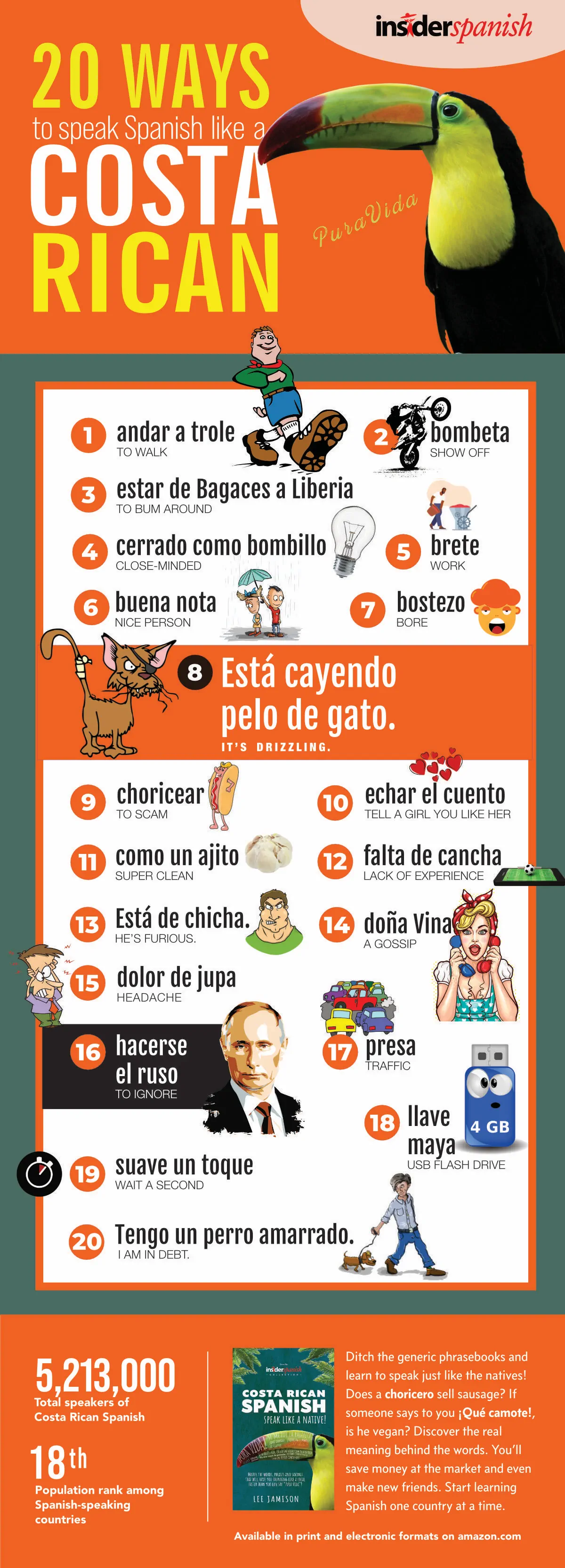
#Ad
Get the Ultimate Guide to Costa Rican Spanish!
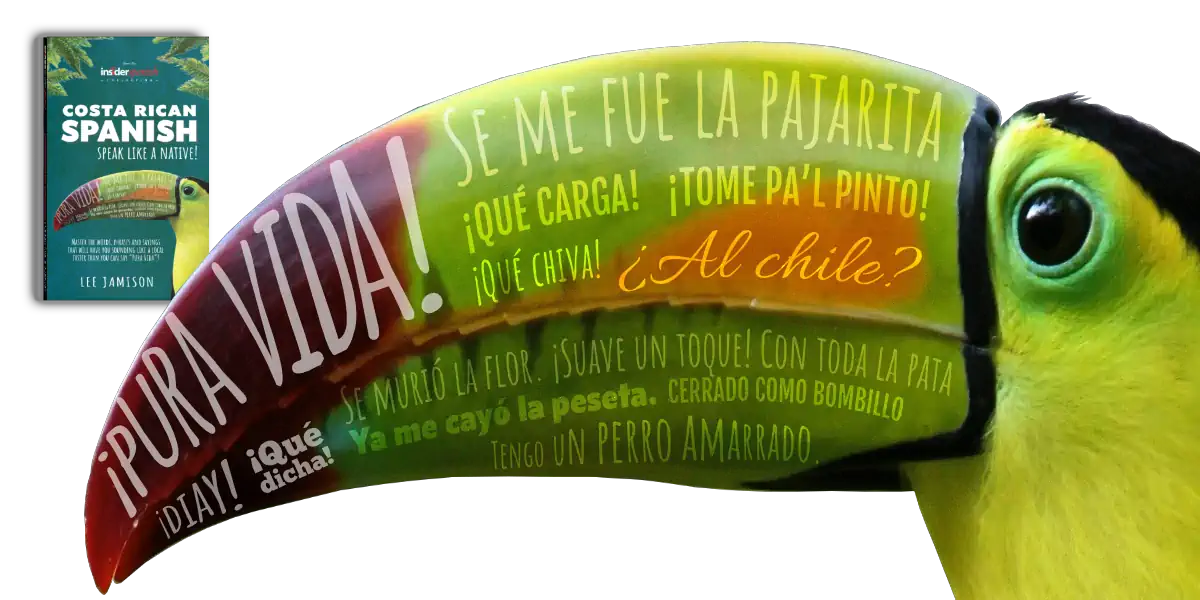
DON'T SETTLE for generic Spanish! Put away the stale phrasebooks and learn to speak just like the natives! Join us as we explore the most common expressions in Costa Rica. Does a CHORICERO sell sausage? If someone says to you ¡QUÉ CAMOTE!, is he vegan? Discover the real meaning behind the words. Make friends and save money at the market. Start learning Spanish…one country at a time. The Insider Spanish series of books have sold thousands of copies the world over. Our guidebooks are not meant to teach you basic Spanish, but rather to tailor your Spanish to the spoken idiosyncrasies of each Spanish-speaking country. Get your copy today! Available in print and Kindle versions.

